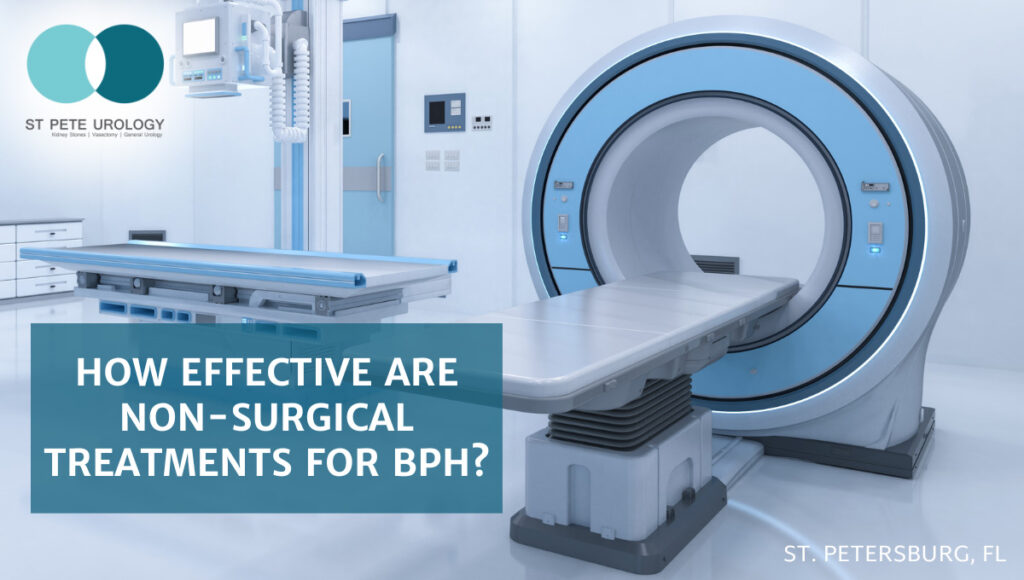Key Takeaways:
- Stress can lead to an enlarged prostate due to increased levels of hormones and a decrease in zinc levels.
- The release of adrenaline due to stress can cause the bladder and prostate to shut down, resulting in more difficult and painful urination.
- Managing stress through lifestyle and behavioral changes such as exercise, sleep and therapy can help prevent prostate enlargement and ease its symptoms.


Its primary function is to secrete an alkaline fluid that adds to the bulk of semen—a mixture of seminal, bulbo-urethral, and prostatic fluid.
With its sphincter muscles, the prostate seals off the entry from the bladder into the urethra, preventing the flow of urine during sexual intercourse. Plus, it contains muscles that help to expel semen out of the penis during sexual intercourse.
Hormone-dependent enlargement
The prostate doesn’t remain tiny for life. It undergoes two phases of hormone-dependent growth: the first at puberty when it nearly doubles its size, and the second after 25 years and for the rest of life.
Now, the prostate requires testosterone to function. But it also contains the enzyme 5-alpha reductase, which converts testosterone to dihydrotestosterone (DHT).
DHT is responsible for development of various male characteristics, such as facial hair. And it equally promotes the enlargement of the prostate.
In fact, if you live long enough, the increased levels of DHT will ensure a continued growth of the gland until you have a condition called an enlarged prostate.
Also called BPH (benign prostatic hyperplasia), an enlarged prostate is a condition where the gland has grown large enough to press or pinch the urethra and cause urinary symptoms.
It occurs in roughly 30% of men over 50 years and in 90% of men aged 80 years.
What is the role of stress in an enlarged prostate?
Stress and BPH are highly related. In fact, the more stressed you become, the worse your BPH symptoms get. And the worse your BPH symptoms get, the more stressed you feel. It is an endless cycle.
But how is stress related to prostate enlargement?
And what should you know about that relationship?
- Stress affects hormones that trigger prostate enlargement
When your body is stressed, it releases more of the cortisol hormone. In men, cortisol suppresses other key hormones such as testosterone.
Now, as your level of testosterone drops, the level of estrogen increases. And the increased level of estrogen indirectly promotes the growth of prostate cells, resulting in an enlarged prostate.
Also, stress increases the rate of conversion of testosterone to dihydrotestosterone (DHT). When an increased level of DHT accumulates in the prostate, it triggers rapid cell growth and development.
While low levels of DHT may not cause an enlarged prostate, a very high level resulting from extreme, prolonged stress eventually causes prostate enlargement.
Actually, DHT is the central hormone responsible for the growth of the prostate both in puberty and young adulthood. Hence, increased levels of DHT due to stress are an important factor in prostatic enlargement.
- Stress depletes zinc
Stress usually causes body zinc levels to reduce significantly.
Zinc is a critical mineral for the prostate, controlling the gland’s rate of expansion. It occurs more commonly in the prostate than in any other human tissues.
So when zinc deficiency occurs due to prolonged stress, the prostate gland enlarges rapidly, resulting in an enlarged prostate.
If you already have BPH, then reduced zinc levels tend to worsen its symptoms.
By reducing stress and eating zinc-rich foods, such as pumpkin seeds, you can boost your body zinc levels, prevent rapid growth of the prostate, and ease BPH symptoms.
- Stress promotes adrenaline secretion
When your body is in a stressful situation, it gets into a ‘flight or fight’ mode that triggers the release of increased quantities of adrenaline.
The adrenaline triggers contraction of muscles of the prostate and bladder. As a result, the prostate compels the urethra to narrow, making passing urine more difficult and painful.
Also, the released adrenaline may cause the bladder to effectively ‘shut down’, worsening urinary symptoms.
So stress is bad for you if you already have an enlarged prostate. It elevates the amount of adrenaline in your body, which impacts both the bladder and prostate and worsens BPH symptoms.
- Stress increases tension in pelvic floor muscles
Lastly, when stressed, your pelvic floor muscles become tenser. And the tightening of these muscles forces the urethra to narrow.
In turn, this makes urine flow more difficult. Hence, if you already have an enlarged prostate, your symptoms become worse.
Prompt management of stress for BPH
If you have an enlarged prostate, it is important that you avoid or minimize stress. Speak about things that are stressing you or causing anxiety and depression with friends, family, or a therapist.
Also, consider lifestyle and behavioral changes to manage stress, including regular aerobic exercise, adequate sleep, and practicing yoga and meditation.
At St Pete Urology, we encourage healthy habits such as avoiding caffeine and minimizing fluid intake a few hours before bedtime. We also recommend speaking with a licensed therapist and joining a support group to help you with stress.
And for those with severe symptoms of an enlarged prostate, we recommend seeing a urologist for treatment to bring the symptoms under control. After that, you may only need annual checkups.
For more information on prevention, diagnosis, and treatment of benign prostatic enlargement and other urological problems, visit the site “St Pete Urology.”
References:
- “Benign Prostatic Hyperplasia (BPH).” Urology Health, Urology Health, www.urologyhealth.org/urology-a-z/b/benign-prostatic-hyperplasia-(bph).
- “Dihydrotestosterone.” Your Hormones, www.yourhormones.info/hormones/dihydrotestosterone/.
- “Enlarged Prostate.” Healthline, Healthline Media, www.healthline.com/health/enlarged-prostate.
- “Prostate Enlargement.” National Health Service, National Health Service, www.nhs.uk/conditions/prostate-enlargement/treatment/.




